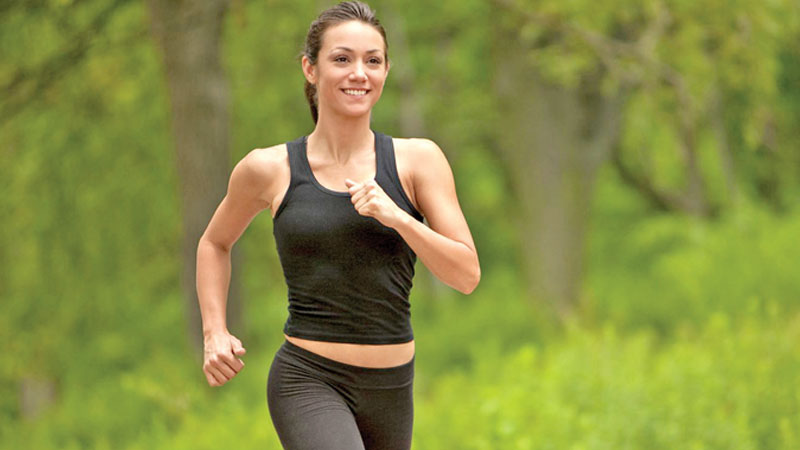Boost your workouts by fueling your body the way professional athletes do.
Even if you never compete in the Olympics or the Major Leagues, you can still maximize your workouts by fueling your body the right way. This will not only give you more energy during exercise and improve your performance, but also help you feel better throughout the day.
These four tips will help supercharge your body for your next workout on the treadmill, the track, or the stairs at work.
1. Hydrate the Right Way
Most people sweat during exercise. How much depends on the intensity of the workout, the environment, and even the athlete’s genes. Drinking enough fluids before, during, and after exercise will keep you from becoming dehydrated. “The best way to determine hydration needs for all athletes is to monitor body weight changes from before to after exercise,” says Kimberly Stein, PhD., a senior scientist at the Gatorade Sports Science Institute (GSSI). Weigh yourself before and after your workouts. If you’ve lost weight, the next time you exercise make sure to drink an additional 16 ounces of fluids for each pound lost. If you gained weight, you may be able to cut back a little on fluids.
The American College of Sports Medicine (ACSM) suggests that you start drinking fluids at least four hours before your workout. That can reduce the need to guzzle water while exercising, which can upset your stomach.
Sports outlets sell a wide variety of sports drinks that include ingredients such as fast-acting sugars and electrolytes like potassium and sodium. For moderate exercisers, however, sometimes simple is best.
“For most fitness athletes, drinking water is fine,” says Stein. “If they have a high sweat rate, notice salt on their skin and clothes after a workout, or have any cramping issues, they may consider a beverage with sodium.”
2. Eat Enough Carbs
Carbohydrates are the main fuel that your body burns during exercise. According to a 2009 article by the ACSM, people who exercise—at any level—should obtain 50 to 60 percent of their daily calories from carbohydrates. Fitness athletes, including people who exercise moderately, may not need to rely on sports gels and fluids to provide their muscles with quick energy.
“[Moderate exercisers] do not have the same carbohydrate needs as a performance athlete,” says Stein. “So unless they are not eating adequate carbohydrate in their diet throughout the day, fitness athletes don’t have a specific need for carbohydrates before, during, or after exercise.”
The ACSM recommends that people consume enough energy—including carbohydrates—during high-intensity or longer length training sessions. This helps to maintain body weight, health, and performance. This is also true for fitness athletes who are training for or competing in long races, such as half or full marathons.
3. Spread Out Your Protein
How much protein you need depends not only on your size, but also on the type of exercise you do. The ACSM recommends that people obtain 15 to 20 percent of their daily calories from protein.
If you are trying to add lean muscle mass, you may need to eat more protein than if you mainly do endurance exercises like walking or running.
Current research, including a 2012 study published in Nutrition and Metabolism, suggests that eating protein more frequently throughout the day improves muscle building. This may mean adding more protein to breakfast—typically a low-protein meal for many people—and cutting back at dinner.
Your exercise goals will also help determine your protein intake. If you are trying to gain lean muscle mass, tone your muscles, or lose weight, Stein suggests eating 20 grams of a complete protein as soon as possible after exercise to support muscle building. The protein should be the type that is quickly digested and absorbed, such as protein found in milk and whey protein.
4. Maintain a Healthy Diet Overall
When thinking about exercise nutrition, it’s easy to focus on what you eat or drink right before or after your workouts. But the rest of the day matters just as much. “Diet is one of the little things that over time can make a big impact on both the health and performance of an athlete,” says Stein. “Like a car, putting in the best fuel will help lead to good performance.”
When it comes to diet, the same principles apply to moderate exercisers as to professional athletes. This includes eating high-quality carbohydrates like whole grains, fruits, and vegetables; lean protein sources, such as lean cuts of meat, poultry, low-fat milk, and beans; and healthy fats from sources like nuts, olive oil, and avocados.
“This pattern will ensure they not only get the macronutrients they need for fuel and to support muscle mass,” says Stein, “but also micronutrients, or the vitamins and minerals.”
- healthline.com



Add new comment